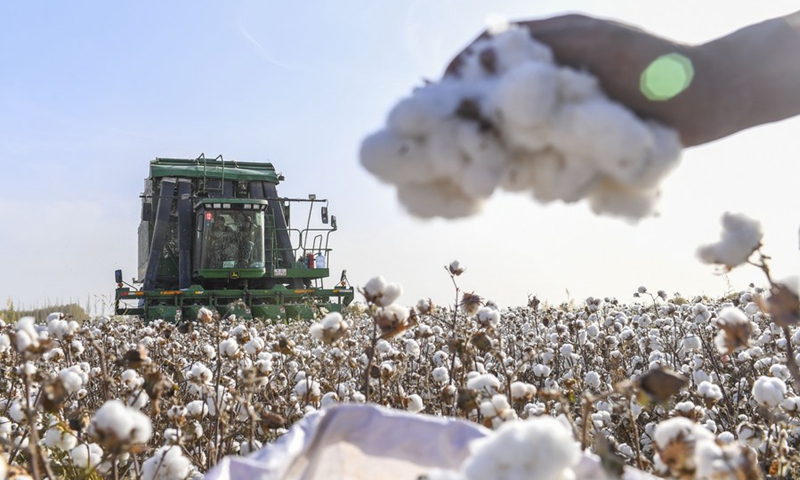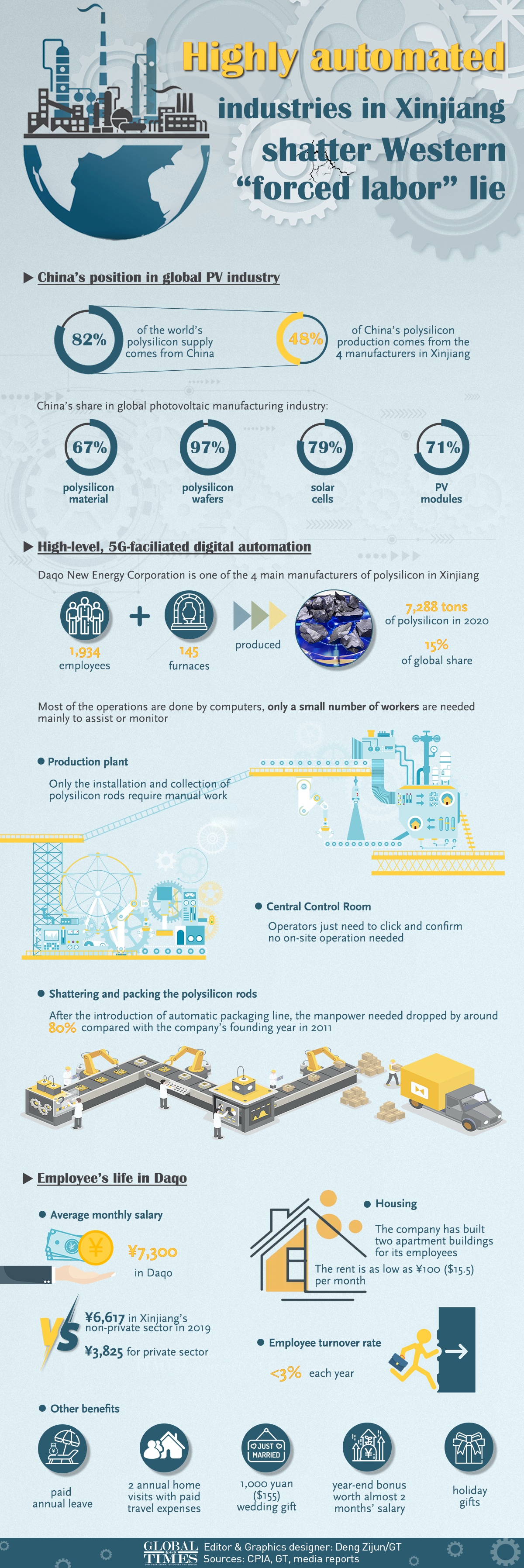US’ coercive ‘Uygur bill’ torments more companies like Intel, enrages 1.4 bln Chinese

A cotton picking machine moves in a cotton field in Dolatbag Town of Bachu County, northwest China's Xinjiang Uygur Autonomous Region. File photo: Xinhua
The signing of the US' so-called Uygur forced labor prevention act, the latest move aimed at attacking China by hyping up "human rights issues" in the Xinjiang region, has put more companies like US chip giant Intel in hot water and ignited the rage of 1.4 billion Chinese people. Experts said that the difficulties of enforcing the law and huge costs paid by American companies after enacting the law will lead to more voices opposing the US' arbitrary move.
On Thursday, US President Joe Biden signed a legislation titled the "Uyghur Forced Labor Prevention Act," which bans products made in China's Xinjiang, citing "oppression" of the Uygur and other minority populations.
China firmly opposes the signing of the so-called Act and will make further responses in light of the development of the situation, China's Foreign Ministry said on Friday.
"This act maliciously denigrates the human rights situation in China's Xinjiang in disregard of facts and truth. It seriously violates international law and basic norms governing international relations and grossly interferes in China's internal affairs. China deplores and firmly rejects it," China's Foreign Ministry spokesperson said in a statement on Friday.

Illustration: Chen Xia/GT
On Friday, the Foreign Affairs Committee of the National People's Congress also said that China will take firm and strong countermeasures if the US insists on acting arbitrarily.
Pushed by some anti-China hawks of the US Congress, the legislation passed in the US House and Senate by unanimous vote early in December. The new law creates a "rebuttable presumption" that all goods partially or wholly produced in the Xinjiang region are "tainted by forced labor." It also requires corporations to prove with "clear and convincing evidence" that imports from the region are not made with forced labor.
The bill has drawn controversy from even within the US, as it results in an increase in the cost of trade for some companies in the US and has a broader impact on the global industrial chain. The Senate and the House had several rounds of "battles" due to differences in each other's versions.
The news of the signing of the act came after US chip giant Intel faced fierce criticism from Chinese netizens as the company required its suppliers to not source goods or service or use labor from China's Xinjiang. Even its apology on Thursday could not ease the Chinese people's rage, with many people calling for more commercial ramifications.
The act means companies are forced to undergo self-review and pull anything related to Xinjiang out of their supply chains - the US is actually attempting to remove Xinjiang from the global industrial chain, Zhu Ying, a professor on human rights law from Southwest University of Political Science and Law, told the Global Times.
The bill has nothing to do with justice or human rights, but it a way for US politicians to hijack US companies' interests in free trade, and force them to kneel down to the US' ideological bias. It also hijacks Americans' right to know the real China and the truth about Xinjiang. It's blasphemy against real democracy, human rights and free trade, Zhu said.
The move also hurts the interests of US companies. For example, as China produces 22 percent of the world's cotton, 84 percent of which comes from Xinjiang, the US' previous moves and hyping of banning imports from China's Xinjiang have hurt US apparel companies.
Apple, Nike and Coca-Cola were among the companies reportedly lobbying the US Congress to weaken the act.

Highly automated industries in Xinjiang shatter Western "forced labor" lie Infographic: Deng Zijun/GT
On Friday, some Chinese netizens commented online that they found that American retailers Sam's and WalMart had withdrawn products related to Xinjiang from their stores in China, and some staff members told the Global Times that Xinjiang products were "out of stock" without further replenishments.
The two retailers gave no official explanation as of press time.
This, together with the news of the US signing the law and the recent controversy surrounding Intel, is adding oil to the fire and has drawn an angry backlash from Chinese netizens, with many calling for a boycott of related US companies as they bite the hands that feed them.
Given the ridiculous and malicious act, many Chinese netizens suggested the country register a newly established rare-earth company in Xinjiang as a countermeasure to the US act. "I wonder what the US will say when we register the rare-earth company in Xinjiang? US politicians always want to boast about 'morality and integrity' but all they have are cunning tricks," a netizen commented.
China's state asset administration has approved a major merger of rare-earth assets to form a new company. China provides more than 85 percent of the world's rare earths and is home to about two-thirds of the global supply of rare metals and minerals.
These measures proposed by the netizens, which may sound "extreme," could have some effects in the short term, but they are not an effective mechanism in the long run as those who made the bill want to see the decoupling of China and the US, and we should not let them get what they want, Li Ye, a lawyer on international trade and laws and regulations on WTO, told the Global Times.
"If some companies abide by the US sanctions out of fear of the law, or even help promote this dismaying trend, China could put them into the list for countermeasures and ask these companies to prove they did not implement the US sanctions," Li noted.
Zhu noted that China could go to the WTO as the US' moves have violated the rules of free trade and also infringed on international rules and regulations. Such a law is made to attack China's industries and also force US allies to take sides. "This is an escalation of the trade war."
Zhu suggested China to promote related laws to protect the products and industries of Xinjiang and punish entities that ban Xinjiang related products.
China's Foreign Ministry spokesperson said on Friday that China will make further responses in light of the development of the situation.
"Xinjiang-related issues are purely China's internal affairs… We admonish the US to correct the mistake immediately, and stop using Xinjiang-related issues to spread lies, interfere in China's internal affairs or contain China's development," said the spokesperson.
Wang Jiang, a distinguished research fellow at the Institute for Frontier Region of China, Zhejiang Normal University, noted that the law is full of speculation by US politicians. For example, it has an eight-year limit and Senator Ted Cruz, who is also one of the main sponsors that promoted the bill, recently announced he is considering running for president in 2024, which means he could hype the bill again to attract more attention.
The US' purpose for promoting the law is obvious: to paralyze Xinjiang's economy and disturb its stability. Wang noted that the economic development in China's Xinjiang region has prospered in recent years with its counter-terrorism measures being effective. "But the bill has deemed measures to fight against poverty in Xinjiang also related to so-called forced labor, which may affect the region's development," said Wang.
There may be more controversies like the one concerning Intel, especially after the signing of the bill, Wang said, noting that some US companies, which are arrogant and confident, may think their products are irreplicable and the Chinese people's rage is temporary, and will pull anything from Xinjiang from their supply chains.
Chinese analysts also noted that the US' act has also put its allies in hot water. Brussels' top trade official, Valdis Dombrovskis, urged caution over EU plans to ban Xinjiang products, arguing that such a "sensitive" measure could risk a trade backlash, the Financial Times reported.


